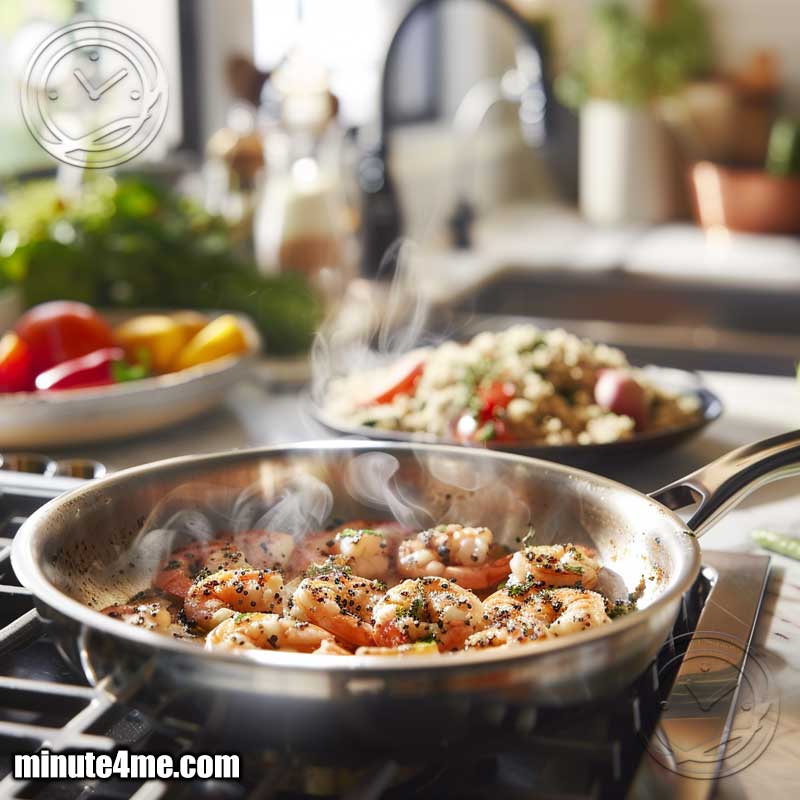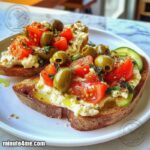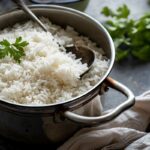Introduction
The Mediterranean diet is celebrated for its vibrant flavors and numerous health benefits, standing as a beacon of balanced eating.
Central to this dietary pattern is the inclusion of lean proteins, among which shrimp emerges as a stellar choice.
Shrimp is not only delicious and versatile but also packed with nutrients that align perfectly with the Mediterranean lifestyle.
In this article, we’ll explore why shrimp is such a fitting ingredient in Mediterranean cuisine and how its nutritional profile and flexibility in cooking make it an indispensable part of a healthy diet.
Why Shrimp Fits the Mediterranean Diet
Shrimp is an excellent fit for the Mediterranean diet due to its health benefits and culinary versatility.
This diet, known for its focus on whole foods, healthy fats, and lean proteins, finds a perfect ingredient in shrimp.
Here’s why:
- Low in Saturated Fat: Shrimp is remarkably low in saturated fat, making it a heart-healthy choice for those looking to reduce their risk of heart disease.
- Rich in Omega-3 Fatty Acids: Essential for heart health, these fats help to lower blood pressure and improve heart function.
- Versatile Protein Source: Shrimp can be easily incorporated into a variety of Mediterranean dishes, from salads to pastas, enhancing the diet’s flavor and nutritional profile.
Mediterranean Diet Dinner Options
Discover the Mediterranean Diet dinner options – a heart-healthy lifestyle, not just a diet. Dive into a world of delicious…
Nutritional Benefits of Shrimp
Shrimp stands out in the Mediterranean diet for its dense nutritional profile, offering a multitude of benefits in a small package.
Here’s a closer look:
- Protein: With about 24 grams of protein per 100 grams, shrimp is an excellent source of lean protein, which is crucial for muscle repair and growth.
- Vitamins and Minerals: Shrimp is rich in selenium, vitamin B12, phosphorus, choline, copper, iodine, and zinc, supporting a range of bodily functions from the immune system to brain health.
- Omega-3 Fatty Acids: The presence of these fatty acids supports cardiovascular health, reducing inflammation and improving heart health.
| Nutrient | Benefit |
|---|---|
| Protein | Supports muscle growth |
| Selenium | Antioxidant properties |
| Vitamin B12 | Energy and nervous system health |
| Omega-3 Fatty Acids | Cardiovascular health |
Cooking with Shrimp: A Mediterranean Approach
Incorporating shrimp into your diet the Mediterranean way means focusing on simplicity and wholesomeness.
Here’s how to make the most of shrimp with a Mediterranean twist:
- Use of Healthy Fats: Cooking shrimp with olive oil not only adds depth of flavor but also provides a healthy dose of monounsaturated fats.
- Herbs and Spices: Flavoring shrimp with garlic, lemon, oregano, and basil introduces antioxidant-rich ingredients into your meals, enhancing both taste and health benefits.
- Diverse Cooking Methods: Whether it’s grilling, baking, or sautéing, shrimp adapts well to various cooking techniques, making it a versatile option for any Mediterranean dish.
13 Tofu Recipes for Mediterranean Diet
Dive into the world of Tofu Recipes for Mediterranean, where health meets flavor in just minutes! Discover the benefits of…
Selecting and Preparing Shrimp
Selecting the right shrimp is the first step towards creating a flavorful and nutritious Mediterranean meal.
Here are key considerations:
- Fresh vs. Frozen: While fresh shrimp is ideal, frozen shrimp can also be a high-quality option if it’s properly thawed.
- Sourcing: Opt for sustainably sourced shrimp to ensure environmental and personal health are both taken into account.
Tips for Buying Shrimp
When buying shrimp, paying attention to its source, appearance, and smell can lead you to the best choices for your Mediterranean dishes:
- Source: Look for labels indicating the shrimp was sustainably caught or responsibly farmed.
- Appearance: Shrimp should have a bright, translucent color with no signs of black spots or discoloration.
- Smell: Fresh shrimp should smell of the sea; any strong, unpleasant odors are a sign of spoilage.
Are you tired of mundane breakfasts that leave you feeling sluggish? Dive into the vibrant world of the Mediterranean Diet…
Mediterranean Cooking Techniques
Adopting Mediterranean cooking techniques not only enhances the flavor of shrimp but also retains its nutritional profile.
Here are some methods and tips:
- Grilling: Imparts a smoky flavor and allows for a lighter dish. Marinate shrimp in olive oil, lemon juice, and herbs before grilling.
- Baking: A gentle cooking method that preserves moisture and nutrients. Try baking shrimp with a medley of Mediterranean vegetables like tomatoes, zucchini, and bell peppers.
- Sautéing: Quick and easy, sautéing shrimp with garlic and olive oil over medium heat brings out its natural flavors while keeping it tender.
By embracing these techniques and insights, you can fully integrate shrimp into your Mediterranean diet, benefiting from its nutritional richness and enjoying the delicious diversity it brings to your table.
Mediterranean Shrimp Recipes
The Mediterranean diet is renowned for its emphasis on fresh, flavorful ingredients, and shrimp is a prime example of a versatile protein that can be used in countless ways to bring this cuisine to life.
Here are three delicious recipes that showcase shrimp in the Mediterranean style, each combining healthful ingredients with simple yet elegant preparation methods.
Recipe 1: Garlic Lemon Shrimp with Quinoa
This dish is a perfect harmony of simplicity and nutrition, highlighting the lightness of shrimp with the zest of lemon and the wholesome goodness of quinoa.
Ingredients:
- 1 lb of large shrimp, peeled and deveined
- 2 tablespoons of olive oil
- 3 cloves of garlic, minced
- Juice and zest of 1 lemon
- 1 cup of quinoa, rinsed
- 2 cups of vegetable broth
- Fresh parsley, chopped for garnish
- Salt and pepper to taste

Instructions:
- Cook the quinoa in vegetable broth according to package instructions; set aside.
- In a large skillet, heat olive oil over medium heat. Add garlic and sauté until fragrant.
- Add the shrimp to the skillet, seasoning with salt and pepper. Cook until the shrimp turn pink, about 2-3 minutes per side.
- Stir in the lemon juice and zest, then remove from heat.
- Serve the shrimp over the cooked quinoa, garnished with fresh parsley.
Nutritional Highlight: This dish is rich in protein and high in fiber, making it incredibly satisfying. The olive oil and shrimp provide healthy fats, while lemon adds a boost of vitamin C, enhancing iron absorption from the quinoa.
Recipe 2: Shrimp and Tomato Basil Pasta
A light yet flavorful pasta dish that embodies the essence of Mediterranean cooking with its fresh ingredients and vibrant flavors.
Ingredients:
- 1 lb of medium shrimp, peeled and deveined
- 2 tablespoons of extra virgin olive oil
- 2 garlic cloves, minced
- 1 pint of cherry tomatoes, halved
- 1/2 cup of fresh basil, torn
- 8 oz of whole wheat or gluten-free pasta
- Salt and freshly ground black pepper to taste
- Grated Parmesan cheese for serving

Instructions:
- Cook pasta according to package directions until al dente; drain and set aside.
- In a large skillet, heat olive oil over medium heat. Add garlic and sauté until golden.
- Increase the heat to medium-high, add shrimp, and cook until they start to turn pink.
- Stir in cherry tomatoes and cook until they soften slightly.
- Toss the cooked pasta into the skillet with the shrimp and tomatoes. Add the torn basil and season with salt and pepper.
- Serve hot, sprinkled with grated Parmesan cheese.
Nutritional Highlight: This recipe offers a good balance of carbohydrates from the pasta and lean protein from the shrimp. Tomatoes and basil provide antioxidants and phytonutrients, while olive oil contributes monounsaturated fats.
Recipe 3: Grilled Shrimp and Vegetable Skewers
Perfect for a summer evening, these skewers bring together succulent shrimp and an assortment of vegetables, all infused with the flavors of the Mediterranean.
Ingredients:
- 1 lb of large shrimp, peeled and deveined
- 2 bell peppers, cut into chunks
- 1 large zucchini, sliced into rounds
- 1 red onion, cut into chunks
- 2 tablespoons of olive oil
- 2 tablespoons of lemon juice
- 1 teaspoon of dried oregano
- Salt and pepper to taste

Instructions:
- Preheat the grill to medium-high heat.
- Thread the shrimp and vegetables alternately onto skewers.
- In a small bowl, whisk together olive oil, lemon juice, oregano, salt, and pepper.
- Brush the mixture over the skewers.
- Grill the skewers, turning occasionally, until the shrimp are pink and the vegetables are tender, about 10-15 minutes.
Nutritional Highlight: Grilling is a low-fat cooking method that retains the natural flavors and nutrients of the ingredients. This dish is high in protein, fiber, and vitamins from the vegetables, with the olive oil adding a dose of healthy fats.
The Role of Seafood in the Mediterranean Diet
Seafood is a cornerstone of the Mediterranean diet, providing a critical source of protein and omega-3 fatty acids.
Its role extends beyond just nutritional value, contributing to the diversity and sustainability of the diet.
Benefits of Diverse Protein Sources
Incorporating a variety of protein sources, especially from seafood like shrimp, offers several advantages:
- Nutritional Diversity: Different types of seafood provide a range of nutrients, including various types of omega-3 fatty acids, essential for heart health and cognitive function.
- Environmental Sustainability: Diversifying protein sources can reduce the environmental impact of our diet, as responsibly sourced seafood has a lower carbon footprint compared to some land-based animal proteins.
Sustainable Seafood Practices
Sustainable seafood practices are vital for the health of our oceans and the longevity of the Mediterranean diet.
Here’s how they make a difference:
- Supporting Marine Ecosystems: Choosing seafood from sustainable sources helps to protect marine habitats and ensures fish populations remain healthy for future generations.
- Responsible Farming: Sustainable aquaculture practices minimize environmental impact, reduce overfishing, and ensure that seafood is safe and healthy to consume.
By embracing the Mediterranean diet’s love for seafood, particularly shrimp, and adhering to sustainable practices, we can enjoy delicious, nutritious meals that also safeguard the health of our planet.
Conclusion
Shrimp is a versatile and nutritious addition to the Mediterranean diet, offering a myriad of health benefits and fitting seamlessly into a variety of dishes.
By exploring the versatility of shrimp in Mediterranean-inspired meals and experimenting with the recipes provided, you can enjoy a diet that is not only healthy but also rich in flavor and variety.
Embrace the delights of shrimp and let it transform your meals into a celebration of Mediterranean cuisine.







